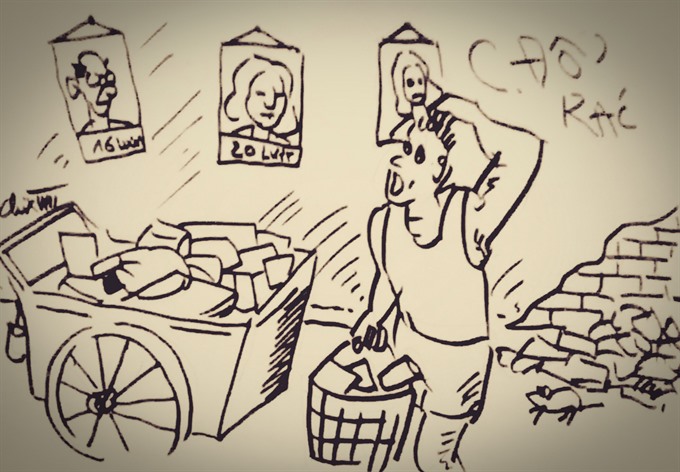 Talk Around Town
Talk Around Town

Have you ever seen a garbage bag sitting (and stinking) in front of your house, even though you hung a sign saying, “Please do not leave trash here”?
 |
By Thu Hằng
Have you ever seen a garbage bag sitting (and stinking) in front of your house, even though you hung a sign saying, “Please do not leave trash here”?
It doesn’t take much looking around to see the effects of indiscriminate litter in the countryside and in big cities.
Piles of trash make the streets look bad and seriously affect the environment and human health. Unfortunately, littering occurs daily and is very difficult to control.
Some claim the reason is that rubbish bins have not been arranged properly on the streets and in public spaces.
Others simply follow others’ behaviour because they think their awareness alone won’t solve the problem.
An image depicting the indiscriminate discharge of waste has been shared on social networks in recent days. It has attracted a great deal of concern, and many people have hailed it as one solution to the social evil of littering.
The photograph shows a banner on the wall with the name and image of two people littering in Ea Tam District of Đắk
Local authorities confirmed the incident and sent officers to inspect but by then the banner had disappeared.
But is posting the names of violators in public places an effective way to control worsening environmental degradation?
I agree: Many people are very selfish, only respecting the cleanliness of their own homes, while filling the surrounding environment with garbage. The act of throwing rubbish around public places should be condemned, and currently the punishment for this action is not strong enough.
But that doesn’t mean we should post the names and images of people who litter, thereby inciting members of the public to take matters into their own hands.
Local people can take a photo and report the incident to the local authorities. Posting the violators’ photo could affect their lives later in unpredictable ways.
Lê Huyền Trang, my neighbour, also agrees with me.
“I think we should have another solution to warn them. This does not only affect them but also affects their relatives,” Trang said.
“I think they give them higher fines.”
But some disagree with us.
“Violators are testing people’s patience,” said Hoàng Thái Sơn, a resident of Hà Nội’s Hai Bà Trưng District.
“I agree with this solution. I have to close the door all day because my neighbours often throw out rubbish near my house. I have hung a sign banning the disposal of garbage but they still leave it here. I’m trying to catch them,” he said.
“We should have stronger measures than fines,” he added. “Raising awareness about environmental protection, reminding people as well as warning them have been underway for many years but many people still ignore the information, while sanctions are not strong enough. The only way is to make them lose face.”
An officer from Mỹ Đình Bus Station told Gia Đình&Xã Hội (Family&Society) newspaper that the bus station did not have the authority to impose fines on people for littering.
However, if anyone litters, they have to collect the rubbish and clean the place where they left waste or face sanctions from police at the station, the officer said.
A number of companies that discharged untreated waste directly into the environment have been punished in recent years. No exceptions should be made for individuals.
Violations of environmental protection rules will be severely penalized in accordance Government policy. Current law stipulates that violators of the regulations on hygiene in public places and on gathering, transporting, burying, filling, treating and disposing of daily-life garbage causing pollution will be fined from VNĐ500,000 to VNĐ7 million (US$22 to $311).
The punishment is clear, but littering persists.
Commune and district chiefs are supposed to issue fines, but some leaders said that it was difficult to do so because they lack professional staff.
Hoàng Thế Minh, who works at a medical company, argues that it is not that difficult to punish violators of environmental protection rules.
Many countries in the world have succeeded in doing so. Within the country, some cities like Đà Nẵng are a good example, he said.
In 2016, Đà Nẵng issued administrative sanction on discharging waste to the sea beach.
Violations have been fined at VNĐ50,000-500,000. If violators don’t pay the fine, their personal papers such as identity card or driving license is seized, or they are taken to local police.
“I think public awareness on environment protection should be more improved. Local authority should ask for help from local residents to inspect and detect violations,” Minh said.
Lawyer Tạ Quang Tòng, deputy chairman of Đắk
Commenting on this case, lawyer Đặng Văn Cường of Hà Nội’s Bar Association, said that although the littering incident had occurred, the warning and possible punishment of violators was the duty of local authorities. It was unlawful for people to post the photos of litterers, he said.
Envionmental protection should be the work of all people, not only the duty of the authorities. We need to leave rubbish where it belongs, but that doesn’t mean we should turn against each other in the process. — VNS




